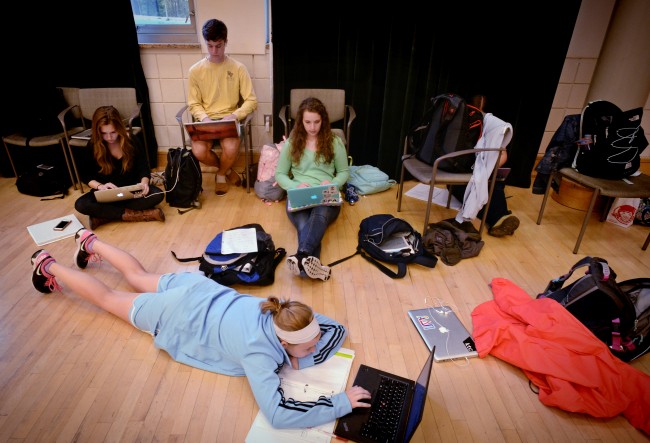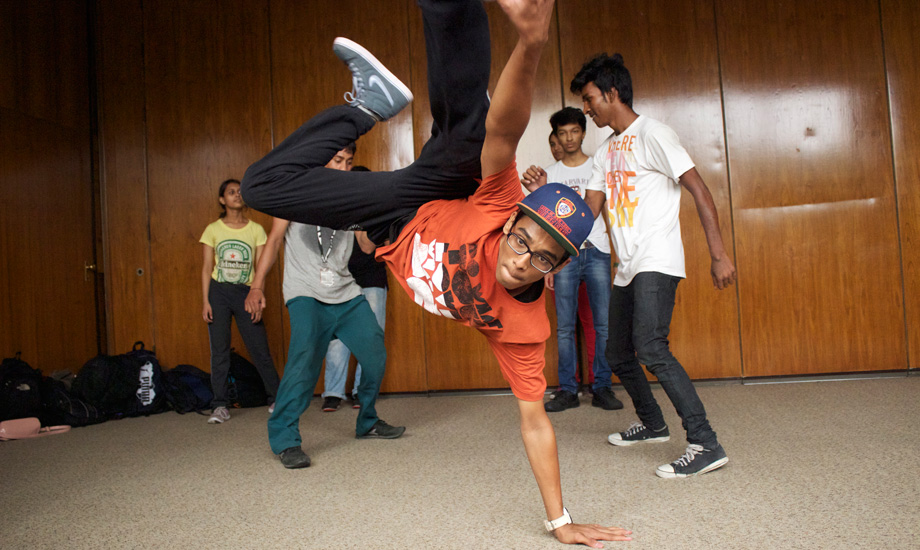
In professional theater, there are obvious ways to tell whether a production has been a success. Reviews. Box office sales. How long an audience applauds – or laughs.
For David Navalinsky, the director of undergraduate production at Carolina, there is a more subtle – and substantial – measure: how much his students learn.
Trained as a technical director, Navalinsky said his job is to be “a backstage guy” to oversee everything from keeping a production on budget to handling day-to-day operations to helping to construct the scenery.
“The students are here to learn how to be part of a creative process,” Navalinsky said. “If they have learned something from the production, even if what they learned is how not to do something – then we have done our jobs. In the end, that’s truly the only way you can gauge success.”
That process of learning and discovery is now under way for “Johnny Johnson,” a play written by Paul Green with music by Kurt Weill, which is part of the campus-wide “A Year-Long Conversation: World War I – The Legacy” sponsored by the Institute for the Arts and Humanities and College of Arts and Sciences.
Based on Jaroslav Hasek’s satiric novel “The Good Soldier Švejk,” “Johnny Johnson” focuses on a naïve and idealistic young man who, despite his pacifist views, leaves his sweetheart, Minny Belle Tompkins, to fight in Europe in World War I.
Johnson manages to bring the skirmish to a temporary halt by incapacitating a meeting of the generals with laughing gas, but once they recover he finds himself committed to an asylum for 10 years.
He returns home to discover that Minny Belle has married a capitalist. He settles down as a toymaker who will create anything except wooden soldiers, his personal gesture of peace in an increasingly warlike society.
The director of the play is Serena Ebhardt, a Carolina alumnus who has been an award-winning actress, playwright and teaching artist.
What she remembers most about her experience as an undergraduate majoring in drama, she said, “was the sheer passion and enthusiasm for the work.”
College theater, Ebhardt said, “is quite beautiful because it is still in a pure form.”

At the professional level, there are sometimes big egos to battle. But at the undergraduate level, it is more the case that the egos need a little boosting; often, the students have more talent than they know. One such talented student is Annie Keller who plays the role of Minny Belle.
“She has a voice like nothing I have heard in my life,” Ebhardt said. “It is absolutely stunningly beautiful. She may be young, she may have more to experience, but in terms of raw, pure talent, I am just blown away.”
Talent among the students comes in many forms, Ebhardt said, including that of first-year student Mary Alex Staude who serves as both the play’s stage manager and dramaturg, a specialist who adapts a work for the stage.
“I’m an English and history nerd. And a drama nerd,” Staude said. “I’m just a nerd. But a lot of the issues that we see in today’s society, particularly in the Middle East, did arise because of a lot of the things that happened in World War I.”
Staude’s passion for history, and her skill working with people made her a natural choice for both jobs, Ebhardt said. “I became the luckiest guest director in the world when Mary Alex walked up and said, ‘Can I help?’”
Once the rehearsals are complete and the show starts, Ebhardt added, it becomes Staude’s show to run.
Ebhardt, like Navalinsky, sees undergraduate productions as an opportunity for students to test themselves and find out exactly what they can do. The Kenan Theater Company is a student-driven organization, which means students do the work.
“Across the board, in terms of stage management and designers and technicians, these are all students working on this project,” Navalinsky said. “Theater is a collaborative art, which means they must learn they cannot work in a vacuum.”There are times during that process, he admitted, when he begins to wonder if all the pieces will come together in time for a successful show. But through the years, he has learned to temper those doubts.

“Every time I underestimate the students, they surprise me,” he said. “They rise to the challenge and I continually learn that lesson.”
In “Johnny Johnson,” there are 18 actors who will perform 68 roles, and there will only be about a week for them to hone their acting because of all the other aspects of the play they must complete, including video projections, sound cues and lights.
“I have actors who are already measuring up to professionals I have worked with,” Ebhardt said. “It’s just that they don’t have a reference point to know how good they are yet so they are a little shy and nervous to throw it out there.
“In the end, they have to own it. They are the ones on the stage and if it doesn’t work for them, it doesn’t work.”
Ebhardt’s advice to all her young actors is to believe in themselves.
“There are a lot of aha moments in our experience together and there is nothing more gratifying for teaching artists than to see your kids make those discoveries for themselves,” she said. “As a director, that is the greatest joy you can have.”
Performances will take place in the Kenan Theatre, in the Center for Dramatic Art at 8 p.m. on Nov. 20, 21 and 22; at 2 p.m. on Nov. 23; and at 5 p.m. on Nov. 24. To reserve tickets for the productions, see drama.unc.edu/johnnyjohnson. Tickets are $10 each, $5 for students.
See a video series about the students’ experiences collaborating on “Johnny Johnson”: ‘Lessons: David Navalinsky,’ ‘Stagecraft: Julia Warren,’ ‘Lights:Katie McCabe,’ ‘Character: Byron Frazelle’ and ‘Voice: Annie Keller.’
By Gary Moss, Gazette


